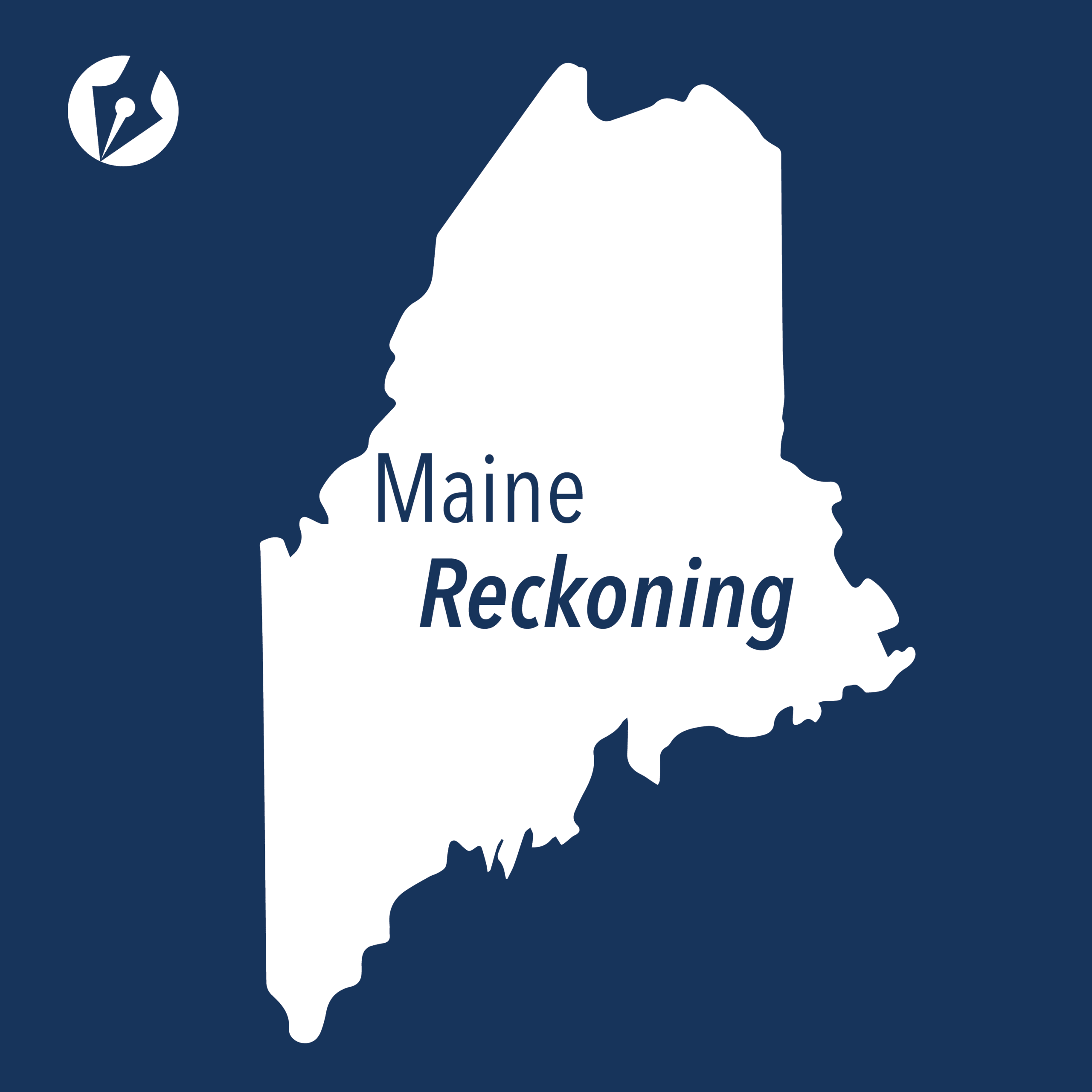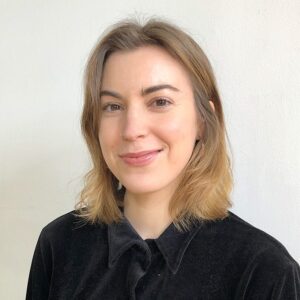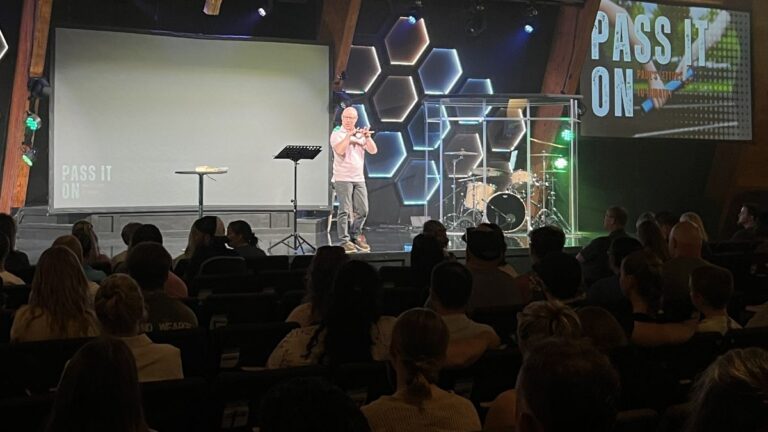This podcast was produced with the support of the Goldfarb Center for Public Affairs at Colby College and the Elmina B. Sewall Foundation.
INTRO: Hi, I’m Tori Lynn and you’re listening to Maine Reckoning. In this podcast, I interview Black Mainers about how their lives have changed since the murder of George Floyd over two years ago. In this episode, you’ll hear my conversation with my friend, Vincent Edwards. He lives in Portland and works at the Greater Portland Council of Governments, but he’s speaking on his own behalf in the interview. We talked about his experience moving to Maine and building a life here at the beginning of the pandemic. Here’s the episode.
Tori: Hi Vincent.
Vincent: Hi Tori.
Tori: I get to interview someone I know as a community member, but also my friend. So thanks for being here with us. And for those that don’t know you, can you just introduce yourself?
Vincent: My name is Vincent Edwards. I’m originally from Chicago, Illinois, by way of Fort Wayne, Indiana. Moved here during the pandemic, and have been here since. It’s been a really good move. I love the area, love the people, mainly I love the food if I’m being honest. Yeah, it’s the seafood that really keeps me here.
Tori: So you were born in Chicago and grew up in Indiana. What is it like in Indiana?
Vincent: I grew up in Fort Wayne, Indiana, which is the second largest city in Indiana. Fort Wayne is not really unlike Portland in a lot of ways. It’s a small city, but like a big town feel. You’re always running into someone that you know. And I feel like that’s the same in Portland, as well. And I really love that, that feeling like I’m getting to the point now in my, probably my second year living here, that like every time I go out I’m pretty much running into someone I know.
Tori: I like the comparison of the large town, small city energy. And then your, what was your college experience like? Am I correct in saying that you were in a fraternity?
Vincent: So I went to Valparaiso University. I joined a fraternity Sigma Pie my sophomore year. I would say my college experience was really good. So many lifelong friends that I’ve made and have kept throughout the years. You know, I look at my college debt and go like, uh, did I have to go to a private school? But I mean, really, it honestly, it was really worth it. I don’t regret it.
Tori: So what was it like being a Black member in a white space of a fraternity?
Vincent: I was the second Black person in the fraternity. I guess I was kind of comfortable in that setting, being a Black person on a majority white campus, just because that is Fort Wayne in a nutshell. I think in Fort Wayne, if you’re a minority, you have to get comfortable being in white spaces. Obviously, you know, dealing with dumb jokes and stereotypes. You know, I don’t wanna, particularly just put on my fraternity, that was just more so just like a life experience. I would say the struggles that I had basically stemmed in folks not understanding we come from different walks of life and we see the world differently. Things that my fraternity brothers would say, things my fraternity brothers would do, sometimes would not rub me the right way based on my experience. And I found a lot of times that I had to explain why I was feeling the way I was feeling, and I think that’s very representative of how most Black people feel in white spaces, most minorities feel in white spaces. You have to put the educator hat on to explain and then educate on, not just your experience, but sometimes the history of minorities in this country, and specifically for me, Black people in this country.
Tori: You then left Indiana, and you came to Maine. You came to Maine in a very interesting time, which was April of 2020 when we were maybe a month into the pandemic. What is it like for you to be in a state with one of the lowest percentages of Black people in this country?
Vincent: Maine definitely is a bit more white than most places. I think I lucked out. I met really cool people like you, Tori, that really helped me be at ease here. But you know, I would say that my hope for Maine is that more people come here from diverse backgrounds. When you come across certain issues, you have to be able to look at it from all sides, and you just can’t do that with people from the same backgrounds that’ve had the same experience that grew up exactly the same way that you did. You know, you have to have more people at the table. I’ve been enjoying my time here in Maine. I’m glad to see a lot of people of color here in Portland. Hopefully when I visit other cities and towns in Maine, I’ll see more diversity as well in the future.
Tori: So you were here for a month and then in May, 2020, Maine and every other state and country really found out about the, the murder of George Floyd. We all found out collectively at the end of May. So as someone that had just moved here and we’re in the middle of a pandemic, and this is your first time living in Maine, how do you think that the response was in terms of the George Floyd murder here?
Vincent: When that happened, I think the entire country just kind of paused. I mean, we were already in the middle of a pandemic and then the top everything off. We have this footage of this Black man being murdered by a police officer, which, you know, just to give context to people, this is not the first time I’ve ever heard of a police officer killing an unarmed Black person. I’ve not had the best experience with police officers. I’ve not had too many experiences here in Portland, so I can’t speak to police officers here. But back in Indiana, I would joke with my friends that I’ve never ever been pulled over with less than three cop cars just because of my physical presence. I’m Black. I’m a bigger guy. I’m younger. Sometimes I have a pullover on because it’s colder outside. For some reason, my presence is threatening in warrants at least three cop cars. And George Floyd happened to a certain degree, unfortunately, it wasn’t a huge surprise. What was a surprise was the response by different communities, not just here in the United States, but around the globe as well. Specifically in Portland, here it was very heartening to see people out protesting. At the time I didn’t feel very comfortable coming out. One, I’m new, two were in the middle of a pandemic. Because I wasn’t there, I don’t really know the makeup of the protests, but from what I could see on the news, I didn’t see a lot of Black people and it just could be the case that there just aren’t that many Black people that live here in Portland or in Maine in general. But it was good to see that those protests were happening.
Tori: It’s a huge thing to suddenly see the city that you moved to erupting in a response. What was that like being away from the family and the community that you grew up with in a new city like Portland?
Vincent: That was pretty, pretty interesting. You know, I have six uncles and aunts, my mom, and you know, they grew up in Chicago during the late fifties and sixties and early seventies, and you know, unfortunately this was not a big surprise to them. We had a lot of family meetings. I think we were having those anyway because of the pandemic, and we couldn’t gather together, but yeah. It was really good to get together and to, I mean, we’re a religious family, so to pray, but I would say that the thing that I took away mostly from my family was that we have to be more active in politics. We have to be more active in our community no matter where our community is. We have to do more. We have to make our voices heard, and that to me really rang true while actually you were running for city council. I think it was so important to make sure that Black people’s voices are highlighted, especially Black women who aren’t just marginalized because they’re Black, but also marginalized because they’re women. And it was really important to make sure to do whatever I could do, which, you know, I was new to Portland, so it wasn’t a lot, but whatever I could do to help you to elevate your voice. For me, it really was just that reminder of, to not just make sure that I’m politically aware, but also just make sure my family, my roommates, my friends, everyone around me is aware of what’s going on.
Tori: You know, for your parents and for your family, this is a common occurrence that’s been happening for their entire existence and for our entire existence. So I definitely was resonating with what you said, but I wanna change gears a little bit and talk about something that’s very important, a very important day, which is the day you and I met each other. So we met at a local nonprofit. I got to interview you for a job, and it was one of the most exciting days of my life.
Vincent: It was very, very, um, surprising actually, I would say that’s probably the word, when I popped up my Zoom and I saw Tori Pelletier’s face, I was quite surprised actually.
Tori: You and I had that moment that like I have, when I see another Black person in a space, I don’t think I’m gonna see another Black person, and we do like the nod or like the smile, because I didn’t know you were gonna be Black and you didn’t know I was gonna be Black. And then we both appeared on the Zoom screen and I was like, oh my gosh. What do you think employers should know about the experience of being Black in a predominantly white workspace?
Vincent: The biggest thing I would say is that Black people bring all of their experiences with them. So when you, the white supervisor or white executive are reacting to a situation or to a problem, even an email, it can be seen differently by your Black staff based on their experience. And I’ve had to explain at every single job that I’ve had, you know, because of my experience here, when you said this, this is what I heard. If you are a white employer or white supervisor of someone who is a minority, you need to understand their experience, their background, their job history, really more so to put them at ease so they can do the best work for you. Also, especially now, there’s so many things that are happening out in the world and politics and even in local community that really affects minorities more than it affects other people. And I feel like employers and supervisors need to give their employees that space. When Roe v. Wade was appealed, there was no space for people just to sit with that grief. And you know, for me as a male, I’m trying to understand how best I can show up for my friends and colleagues who are women or my friends and colleagues that can produce children, and there’s just no space for that. And I just think that we, and I’ll say we, like we as a people, as a society, we just need to do a better job of supporting people who are minorities, whether they are racial minorities, whether they are gendered minority, et cetera, et cetera. We just need to create that space. I would challenge any employers or supervisors listening to create that space within the organization.
Tori: I’m now thinking about the fact that, as you mentioned, Roe v. Wade being overturned, all of these things are happening that have disproportionate impacts on Black and brown individuals. This is a heavy question I’m coming at you, but what do you think the future holds for us if we keep having these disproportionate impacts of terrible events with no space? No one is holding space for us.
Vincent: I think a couple things could happen. One is, and this is my hope, is that these things that happen in our society prompts people like you, like a Corey Bush, to run for public office. People who are smart, people who represent their neighborhoods, specifically people that actually live in the neighborhood that they’re running. I just wanna be very clear about that. Hopefully it prompts other people that even if you can’t run, that you are supportive to those that do. If it’s just you sharing their post on your social media, great. If it’s you going out door to door, stomping for them, great. I hope it doesn’t take terrible things to happen every single time to prompt people to go out and run for public office, but you know, unfortunately, I feel like that’s just been the history of how it’s happened. The second thing is that you’re gonna see Black people and other minorities go to more liberal areas of the country where they can get normal everyday services. You know, it’s crazy to me to think that someone who unfortunately can’t bring a child to term can’t get a safe abortion. You know, because some religious zealot that has power in Congress decided that was the case. Someone that doesn’t even know that person, you know, gets to decide what they can do with their body based on their religious belief. It doesn’t seem very American, it doesn’t seem right.
Tori: I’m not trying to start any rumors, but that sounded like a soft launch into your political career. Do you think that you would ever get involved in politics?
Vincent: I am open to be someone’s chief of staff.
Tori: You heard it here first. So thinking about now you’re in Maine, you’ve been here for a couple of years, do you think that you’ll stay? Is Maine gonna be your forever home
Vincent: I don’t know if I believe in forever homes. Um, I have no clue what life is gonna look like in five years. As much as I love Maine, and I do love Maine, you definitely have to have the coins. It is a little pricey here. I look at housing prices. I mean, it just doesn’t even compare to Indiana, like not even in the same sentence. So, I would say I hope. I hope to stay in Maine. I like it here. I like the little community that I’ve built for myself here.
Tori: And you mentioned it takes a lot of coins. Speaking of coins, do you have any additional career goals that you’re hoping to accomplish?
Vincent: What do you wanna be when you grow up? Um, I have no clue. You know, I’m on our diversity, equity and inclusion committee at my organization, and that has been really good fulfilling work for me. I hope to continue on learning and growing, but I would say the future is bright.
Tori: I think I wanna wrap just with, do you have any hopes in general for, for Maine and for Portland?
Vincent: I think Maine is really looking to diversify. I mean, let’s be real. Maine is a old state. We need more younger people to move here, and a lot of those younger people are from diverse backgrounds, and we need to do a better job of creating space for minority led organizations to set the table for these folks that eventually will move here. One of the things I always say when I’m talking about DEI, which is diversity, equity, and inclusion, is that it’s better when you’re coming over to someone’s house for like a dinner party, that the table is already set for you, that there’s already a seat there for you. There’s already a plate and silverware and a glass for your wine like it’s doesn’t feel great when you arrive and there’s this big hurry to find a chair that doesn’t really fit with the other chair at the table and to find a plate that doesn’t necessarily fit with the other China. We have to set the table to make sure that people feel welcome when they come here. I would say that’s my biggest challenge for Portland, my biggest challenge for Maine. Set the table for folks so that when they come here, they feel welcome.








